Antibody activates immune system against pancreatic cancer
Pancreatic cancer deceives the immune system with a sugar coat and thus evades the immune system. Researchers at Northwestern University have deciphered this mechanism and developed a monoclonal antibody that blocks camouflage. In mice, the therapy reactivated immune cells that attacked tumors and significantly slowed down growth. The results, which were published in Cancer Research on Monday just in time for Pancreatic Cancer Awareness Month (DOI: 10.1158/0008-5472.CAN-25-0977), open up a promising approach against one of the deadliest cancers.
Pancreatic cancer is usually diagnosed late, hardly responds to chemotherapy and has a five-year survival rate of only 13 percent. Even modern immunotherapies, which are successful in other tumors, often fail here. “We wanted to know why the immune system in the tumor is at a standstill ã and whether we can turn it back on,” explains study leader Mohamed Abdel-Mohsen, associate professor of infectious diseases at Northwestern University Feinberg School of Medicine.

Sugar signal as a “do not attack” command
The team discovered that healthy cells present sialic acid, a sugar that sends the signal “do not attack” to immune cells via receptors such as Siglec-10 ã a natural protective mechanism. Pancreatic tumors hijack this system. They load sialic acid onto the surface protein integrin öÝ3öý1 and thus bind to Siglec-10 on macrophages and other immune cells. “The tumor disguises itself like a wolf in sheep’s clothing,” Abdel-Mohsen describes the deception.
Antibody lifts the blockage
The researchers developed monoclonal antibodies that prevent precisely this binding between siglec-10 and the sugar-laden integrin. In cell cultures and two mouse models, macrophages awoke from their paralysis, ate cancer cells (phagocytosis) and significantly reduced tumor growth compared to untreated controls. “We tested thousands of hybridomas until we found the right antibody,” reports Abdel-Mohsen. The discovery and development took six years.
Combination therapy as a goal
Next step: The antibody is to be combined with existing chemotherapies and checkpoint inhibitors. “We are not just aiming for a slowdown, but a complete remission,” Abdel-Mohsen emphasizes. At the same time, a companion test is being developed to identify patients whose tumors are based on this sugar pathway ã a prerequisite for personalized therapy.
The Northwestern scientists are currently optimizing the antibody for humans and are planning initial safety and dosage studies. If everything goes according to plan, the therapy could be clinically available in about five years.
Broader potential
The mechanism could be relevant beyond pancreatic cancer. “We are testing whether other difficult-to-treat tumors such as glioblastomas use the same trick ã and whether it also plays a role in non-oncological diseases,” says Abdel-Mohsen. His laboratory works in the field of glyco-immunology, which investigates how sugars control the immune system.
The study was funded by the Center for Human Immunobiology at Northwestern University and several NIH grants, among others. Abdel-Mohsen is a member of the Robert H. Lurie Comprehensive Cancer Center.
Original Paper:
Editor: X-Press Journalistenbû¥ro GbR
Gender Notice. The personal designations used in this text always refer equally to female, male and diverse persons. Double/triple naming and gendered designations are used for better readability. ected.




